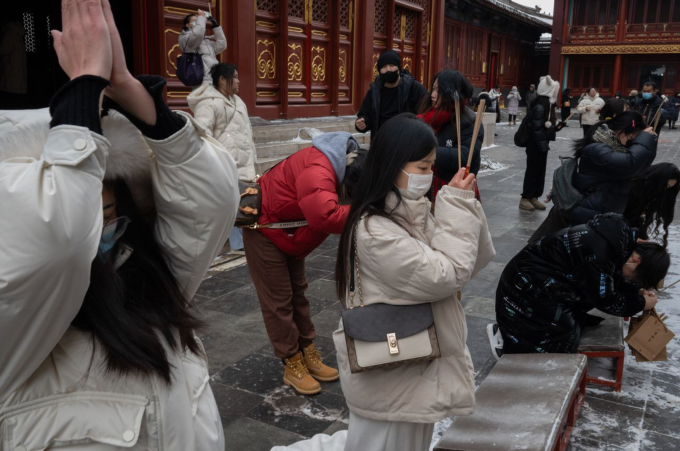As the government repeatedly urges young people to be ambitious, work hard and overcome adversity, Li Jiajia can only hope to win the lottery.
Demoralized by a slumping economy, unfulfilled jobs, and pressure to marry and have children, young Chinese like Li are looking for a way out, regardless of the country's priorities.
In April this year, Li, 24, from a province in southeastern China, came to Beijing to work at a technology startup after a long period of unemployment. But instead of being determined to reach the top of her career, the young woman said she would settle for low wages and few opportunities for development.
Li's only pleasure during this time was buying lottery tickets. The young girl was not sure if she could win the jackpot, but she could still hope for a better life.
"It (winning the lottery) won't happen right away, but enjoying the thrill of scratching the ticket and checking the winning numbers helps me relax a little bit," Li said.

Li Jiajia in Beijing says instead of hoping for a job to change her life, she is now relying on luck.
In fact, young people like Li used to study hard to get into prestigious universities, spending most of their time in the office to pursue the expectations of themselves, their families and society. But the impact of two years of the pandemic, a record unemployment rate of 21% this year and low wages have left young workers disappointed.
Sara Friedman, a professor of anthropology and gender studies at Indiana University in the US who specializes in Chinese society, said young people used to spend a lot of time, effort and money to enter the labor market, hoping to achieve success.
"They have worked very hard but now choose to leave and not participate because of disappointments and invisible pressure from society," Friedman said.
Social media discussions about temple visits and anxiety — the biggest concern for many young Chinese — increased in 2023, according to research firm BigOne Lab.
About 34% of respondents in their mid-20s have quit their jobs or are considering leaving their companies, according to statistics from Chinese social and job search platform Maimai.
While Li turned to the lottery for luck, many other young people decided to quit their jobs, turning to meditation, fortune telling or visiting temples in the mountains to find peace. Or some held parties to celebrate their retirement to find freedom, creating opportunities for many industries to develop.
Statistics show that playing the lottery has also become a hobby for 29-30 year olds in China. It boosted the country's sales to $67 billion from January to October, up 53% from last year, with each person spending an average of $48 on this type of game.
Data from Ctrip, China's largest online travel agency with more than 300 million registered members, shows that the number of bookings for sightseeing tours related to temples in 2023 is three times higher than the same period last year. Of these, half of the bookings are from Gen Z (the group born between 1997 and 2012), becoming the main force driving the "temple tourism fever".
According to Ctrip statistics, the cumulative views of the terms "copying Buddhist scriptures" and "meditation" on social media in China have reached three billion, and a large number of users have posted videos such as exercise instructions, vlog experiences, and the effects of meditation.

Many young Chinese workers choose to go to temples to pray for luck and peace instead of striving hard.
In addition, many terms describing moods over the years are showing that people's working attitudes are gradually changing. In 2020, the term "neijuan" (encroachment) refers to the standard of hard work and striving. Next is "touching fish" - a phrase borrowed from Chinese idioms referring to underground rebellions in the workplace such as hiding in the toilet to avoid work, shopping online or reading novels during work hours. In 2021, "tang ping" (lying flat) refers to those who refuse to strive at work and in 2022, "bailan" (ignoring life) refers to the generation that chooses to let things rot.
A 2022 survey by research firm Tsingyan found that 96% of 6,000 respondents in China aged 26-40 admitted to lying flat to some degree.
Slivia Lindtner, an ethnographer at the University of Michigan, said it was a very passive form of resistance. "It was definitely a very difficult moment, but it was also seen as a hope for workers to resist pressure," the expert said.
According to experts, from some perspectives, China's "tang ping" trend is similar to America's mass resignation after the pandemic or the rejection of social norms by young people in the West since the 1960s.
Amy Yan, 27, of Shenzhen, sees lying flat as a subtle way to resist the pressures on young people to succeed. For years, Yan helped her parents run their export business. But last year, the business went bankrupt when her parents were defrauded of their assets. That reinforced Yang’s belief that she should put herself first, find a quiet place to retire early and let go of all the striving.
However, Chinese leaders fear that if all young people give up working and rely on their parents' finances, the unemployment rate could reach more than 46%, according to calculations by a Peking University professor in early 2023.
The China Youth Federation, which has more than 70 million members, recently published comments on its WeChat account, calling on college graduates not to refuse to join the workforce because of difficulties in finding jobs, while others choose to lie flat out of boredom and despair.
But academic research shows that social mobility has stagnated for many groups in China, meaning that those who have become young are no longer motivated to get ahead. Especially as many employers that once attracted young workers, such as Alibaba, Tencent, and ByteDance, are laying off workers amid weak growth and a government clampdown on the private sector. Tech wages have fallen for three straight years, according to Maimai, and the prospect of looming paychecks has left workers who once worked a 996 schedule (9am to 9pm, six days a week) increasingly desperate. They don’t want to push themselves to get promoted, buy a house, or have children like previous generations.
Huang Xialu quit her job as a product manager at one of China’s largest video streaming companies in April 2023 and turned to spiritual retreats. Long before that, the 33-year-old said she struggled with a lack of purpose.
“I always thought if I didn’t quit my job and take a break, I would go crazy,” Huang said. A few months later, she took a life coaching course and learned pottery in the countryside.
For Huang, lying flat is the opposite of being passive—it’s a way to take control of her life and avoid invisible worries. Now the 33-year-old has become a coach who helps people who are confused about their future choices, despite their unstable income.
"But I don't regret giving up because of my desire to heal my soul," she said.
According to VnExpress